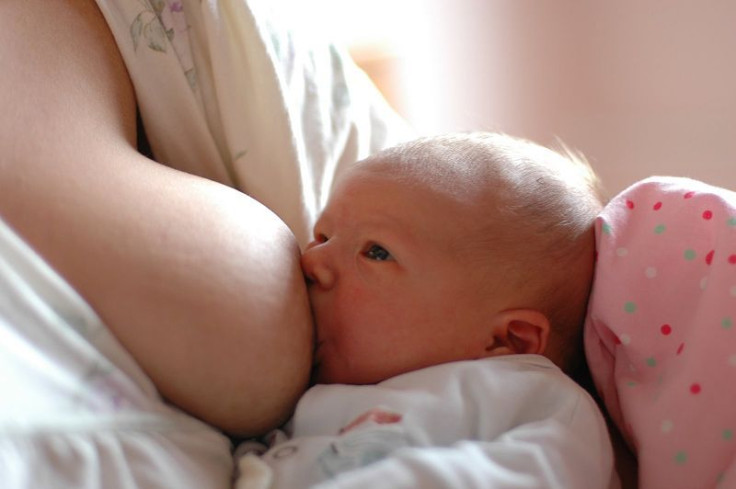5 Ways Newborn Breastfeeding Can Improve Your Baby's Health

The age-old debate of whether to breastfeed or formula feed your newborn is one many expectant mothers will have when deciding what's best for their baby's health.
Mothers who opt for exclusively breastfeeding their babies must feed their children just breast milk for the first six months and then continue to do so for a minimum of one year says the American Academy of Pediatrics (AAP).
Research published in the Journal of Pediatrics showed that out of 85 percent of mothers who wanted to do exclusive breastfeeding, only 32.4 percent went through with their decision. All 3,000 women who were in their third trimester of pregnancy during the study wanted to exclusively breastfeed but only one percent met their goal.
The discrepancy in mothers who want to do exclusive breastfeeding and those who actually commit to the task suggests that there needs to be wider support for new moms to breastfeed. Hospital staff members play a crucial role in encouraging breastfeeding, and helping women physically perform the task; the Centers for Disease Control and Prevention (CDC) reports that one in three women stop breastfeeding early because they have a hard time doing so without hospital support.
Despite the minimal support of hospitals who encourage this practice, breastfeeding rates continue to rise in the United States. According to the CDC's 2012 Breastfeeding Report Card, both breastfeeding initiation rates and the rates of those mothers breastfeeding at six and 12 months increased by two percent from 2008 to 2009. This data suggests that breastfeeding rates are gradually rising now that there is an increased awareness of the health benefits it can bring to their newborns.
Here are five ways that breastfeeding can promote good physical and cognitive health in your bundle of joy.
1. Lowers the chance of illness.
Newborns who are breastfed have less of a risk of developing diseases such as type 1 and type 2 diabetes, high cholesterol, and inflammatory bowel disease. In a study published in the British Medical Journal, researchers examined how exclusive breastfeeding shielded newborns against common infections during infancy. The study followed 926 infants for 12 months and took note of how the children were fed and the infections they had.
The results showed that infants who were exclusively breastfed had fewer infectious episodes and fewer hospital visits to treat infections during their first year of life compared to non-breasted infants. However, infants that were partially breastfed (only up until six months) were not protected from infections during their first year. The antibiotics found in breast milk are suspected of boosting a newborn's immune system.
2. Reduces the risk of SIDS by 50 percent.
The risk of Sudden Infant Death Syndrome (SIDS) is cut down by half in infants who are exposed to exclusive breastfeeding when they are one month old. SIDS is the leading cause of death in the U.S. for babies between the ages of one month and one year old. The syndrome occurs when a baby has an immature or abnormal heart, breathing, or response complications.
In a German study published in the Journal of Pediatrics, researchers examined look at the feeding habits of 333 infants who died of SIDS, and 998 infants of the same age group who did not. The results showed that infants who were exposed to exclusive breastfeeding reduced their risk of SIDS by 50 percent. Partial breastfeeding also reduced the risk of SIDS but proved to be miniscule. The CDC confirms that babies who are formula fed and received partial breastfeeding had a higher risk of developing SIDS.
3. Shields from the development of allergies.
Babies who are breastfed are exposed to secretory IgA, an antibody that is only found in breast milk, are less at risk to develop allergies because of the layer of protection it provides in the newborn's intestinal tract. Those that are formula-fed are at a disadvantage because of the lack of exposure of this antibody. The formula given to infants is either cow's milk or soy which exposes infants to allergens at an early age and makes them vulnerable to inflammation and further health issues. In a study, the risks of mothers not breastfeeding infants showed that those were formula fed were at higher risk of developing allergies due to the exposure of foreign antigens in cow's milk and soy products.
4. Reduces the chance of childhood obesity.
Breastfeeding can reduce an infant's risk of becoming overweight or obese, according to the American Academy of Pediatrics (AAP). Babies who are breastfed adopt a healthy eating pattern as they grow because they learn to consume until they are full, and no more. Breastfed babies also have more leptin, a hormone that regulates appetite and body fat — whereas infants who are formulafed are exposed to high levels of insulin which creates fat.
The results of a Harvard Medical School study showed that infants who were breastfed (exclusively or partial) had a 20 percent lower risk of being overweight in their preteen and teen years. "Breastfeeding may prevent obesity later in life," said lead author Michael Gillman.
5. Boosts IQ.
Infants who are breastfed milk tend to have higher cognitive abilities than formulafed infants according to a seven year study conducted at the Jagiellonian University Medical College in Poland. In the study, 468 infants were tested from infancy through their preschool years, and those who were breastfed outperformed those who were formulafed.
"I believe the IQ effect may in part be explained by this dynamic interaction between mother and child in the breast-feeding process" says researcher in the study and medical epidemiologist, Wieslaw Jedrychowski.
Published by Medicaldaily.com



























